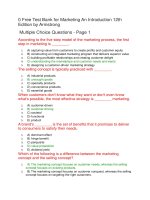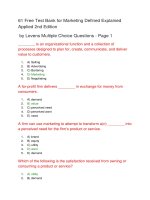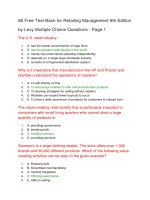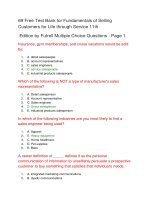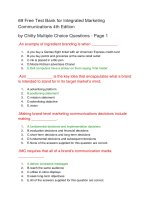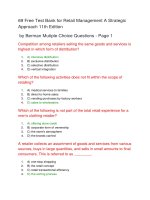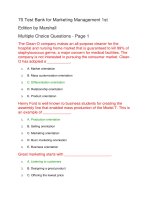69 free test bank for marketing management 4th edition
Bạn đang xem bản rút gọn của tài liệu. Xem và tải ngay bản đầy đủ của tài liệu tại đây (40 KB, 11 trang )
69 Free Test Bank for Marketing Management 4th
Edition
by Winer Multiple Choice Questions - Page 1
Identify the statement that supports ubiquitous marketing
department concept.
1.
A) Marketing is performed by all departments and functions in an
organization.
2. B) Marketing is what the people in the marketing department do.
3. C) Employees in an organization are collectively responsible for marketing
efforts.
4. D) Marketing department should be integrated with service and sales.
The traditional value chain adopts a ________ oriented approach.
1.
2.
3.
4.
A) company
B) customer
C) service
D) competitor
What are the two dimensions of the four-quadrant model as
presented by Gary Hamel and C.K. Prahalad?
1.
2.
3.
4.
A) customer needs and customer types
B) consumer demand and perceived value
C) value provided and cost incurred
D) brand value and actual sales
Which of the following is not a component of the traditional value
chain?
1.
2.
3.
4.
A) inbound marketing programs
B) raw materials
C) product/services
D) assets/core competencies
Which of the following is an example of internal change?
1.
2.
3.
4.
A) change in customer preferences
B) a new regulation
C) price change of raw materials
D) automation decision
Why is ubiquitous marketing concept considered to be dangerous?
1.
2.
A) It has a negative impact on the performance of marketing department.
B) It would result in increased costs for the company.
3.
4.
C) It would reduce the importance of a distinct marketing department.
D) People from other departments may refrain from marketing efforts.
________ driven approach is an aggressive, push-the-catalogue
approach to marketing.
1.
2.
3.
4.
A) Technology
B) Sales
C) Marketing
D) Customer
The danger associated with remaining customer-led is that:
1.
2.
3.
4.
A) businesses may ignore unexploited opportunities.
B) customer benefits may not be considered always.
C) businesses might ignore core competencies when serving customers.
D) the marketing programs would turn out to be outbound.
Identify the question that is least significant in determining whether
your organization is customer-oriented.
1.
2.
3.
4.
A) Are you easy to do business with?
B) Do you keep your promises?
C) Do you use frequent advertisement?
D) Do you meet the standards you set?
Which of the following approaches has the least amount risk
associated with it when developing a new product?
1.
2.
3.
4.
A) marketing driven
B) sales driven
C) technology driven
D) customer driven
Marketing is pervasive in most developed economies due to:
1.
2.
3.
4.
A) large disposable income.
B) increased competition.
C) increased consumer awareness.
D) intense economic activity.
Which of the following is a disadvantage of an over-engineered
product?
1.
2.
3.
4.
A) The quality of the product will be low.
B) It is less robust for its application.
C) It is associated with operational problems.
D) The product will have unwanted features.
Marketing is involved and necessary when:
1.
A) the sellers have increased bargaining power.
2.
3.
4.
B) the buyers have many choices.
C) there is no competition in the industry.
D) the market is monopolistic.
A company that follows the marketing concept philosophy should:
1.
2.
3.
4.
A) serve all customer needs at all costs.
B) understand that the customer is always right.
C) understand that there is no such thing as a bad customer.
D) serve only profitable customers.
The marketing concept philosophy emphasizes the need to have a:
1.
2.
3.
4.
A) price advantage.
B) unique product.
C) sustainable strategy.
D) customer focus.
Which of the following statements supports the sales driven
approach to the marketplace?
1.
2.
3.
4.
A) Profit maximization is the ultimate motive of a business.
B) A superior product can drive the sales in a company.
C) Market capitalization is the ultimate motive of a business.
D) Sales and profit maximization are dependent on customer value.
Which of the following is a disadvantage of sales driven approach?
1.
2.
3.
4.
A) It is not suitable for services such as banking.
B) It might not deliver long term value to customers.
C) The company cannot make profits.
D) It uses inexperienced sales personnel.
According to the text, organizations can become customer-oriented
by:
1.
A) distributing information on all important buying influences only among
marketing department personnel and brand managers.
2. B) making strategic and tactical decisions interfunctionally and
interdivisionally.
3. C) spending large sums of money in research and development.
4. D) introducing line extensions rather than creating new products.
Identify a criticism that is often associated with marketing.
1.
2.
3.
4.
A) It makes customers buy things that they do not really want.
B) It is not helpful in creating customer value.
C) It fully ignores customer needs and wants.
D) Marketing is often restricted to branding and communication.
Customers will not always be able to tell you what products they
want and need because:
1.
2.
3.
4.
A) customers are aware of only the problems that they have.
B) customers are not conscious about the cost of product development.
C) a marketer may not have direct contact with the customer.
D) the solutions suggested by customers will not be feasible.
Which of the following is a plausible marketing observation?
1.
A) Marketing managers must spend a considerable amount of time talking to
customers.
2. B) New competitors' actions are easier to predict than existing competitors'
actions.
3. C) Customers can always tell you what products they want and what features
they need.
4. D) Unlike general societal trends, changes in customer tastes occur
frequently.
Which of the following is the key difference between traditional
value chain and the new versions of the value chain?
1.
2.
3.
4.
A) The value chain starts with the customer in the new perspective.
B) Customer needs are ignored in traditional value chain.
C) Traditional versions are not focused on core competencies and assets.
D) Outbound marketing chain is used in the new perspective.
Strategic and tactical decisions in a customer-oriented organization
should be made:
1.
2.
3.
4.
A) cross-functionally and cross-divisionally.
B) by the marketing department.
C) by the services department.
D) by the customer relations department.
Which of the following observations is true about the market driven
approach to marketplace?
1.
2.
3.
4.
A) This kind of organization embraces marketing to excess.
B) This approach is adopted by high-risk taking companies.
C) This approach is not suited for consumer goods manufacturers.
D) This kind of organization can quickly respond to changes in the
marketplace.
Which of the following is the main focus of a sales driven
organization?
1.
2.
3.
4.
A) Creating and delivering customer value.
B) Maximizing the profit generated.
C) Increasing market share and volumes.
D) Converting the marketing efforts to profits.
Which of the following organizational structures will be suited for a
company that sells business to business products?
1.
2.
3.
4.
A) market-based structure
B) product-focused structure
C) classic brand structure
D) internationally focused structure
A company can maximize sales by offering the best product. This
statement supports the ________ driven approach.
1.
2.
3.
4.
A) marketing
B) sales
C) technology
D) customer
Which of the following is the disadvantage of marketing driven
approach to the marketplace?
1.
2.
3.
4.
A) This kind of organization is slow to respond to changes.
B) This approach is associated with high level of risk.
C) It is not suited for high-scale products such as consumer goods.
D) This approach does not consider customer opinion.
Product-focused organizational structure is not suited for:
1.
2.
3.
4.
A) business-to-business products.
B) retail products.
C) consumer durables.
D) internationally focused products.
Which of the following statements is not consistent with the
marketing concept?
1.
2.
3.
4.
A) The focus of a business is not profits but customers.
B) A business should have competitor focus.
C) Customer needs should be served at all costs.
D) A business need not serve unprofitable customer segments.
Which of the following statements supports technology driven
approach to the marketplace?
1.
2.
3.
4.
A) Products should be tested and proven before releasing them.
B) Providing technology to salespeople can help increase volumes.
C) Quality improvement in products can result in customer value.
D) Customer information systems can be used to increase sales.
Cross-tab Research Inc. is a research services company that offers
market research services to companies worldwide. Which of the
following types of companies would be great customers of Crosstab?
1.
A) marketing driven
2.
3.
4.
B) sales driven
C) technology driven
D) customer driven
An organization spends heavy research and development and has
a product focus. This organization is likely to have a ________
driven approach to the marketplace.
1.
2.
3.
4.
A) sales
B) marketing
C) customer
D) technology
A lowest level manager in product management structure is
termed:
1.
2.
3.
4.
A) product manager.
B) marketing manager.
C) product group manager.
D) planning manager.
A few customers cost more to serve than the revenues they
generate. Identify the most appropriate way to handle these
customers.
1.
2.
3.
4.
A) Attempt to turn away the unprofitable customers.
B) Provide services at a discounted rate to these customers.
C) Avail preferential treatment to these customers.
D) Design specific marketing messages for these customers.
Which of the following observations is true regarding a customeroriented organization?
1.
A) Marketing in these organizations translate benefits into products and
services.
2. B) These organizations create needs for customers.
3. C) These organizations spend more on R&D than marketing.
4. D) These organizations spend heavily on research till the product is finely
honed.
69 Free Test Bank for Marketing Management 4th
Edition by Winer Multiple Choice Questions - Page 2
Which of the following is an example of external change?
1.
2.
3.
4.
A) an automation decision
B) employee strike
C) change in customer preferences
D) change in employees' attitude
Which of the following would persuade a firm to enter foreign
markets?
1.
2.
3.
4.
A) low-growth markets
B) decreased domestic competition
C) increased growth rate
D) sensitive regulations
Marketing plans should be written because:
1.
2.
3.
4.
A) it provides a concrete history of the product's strategies.
B) it is mandatory for a registered firm to have a written marketing plan.
C) it considers the external environment alone to make decisions.
D) written marketing plans can be distributed to all stakeholders.
Which of the following statements about mobile phone usage is
true?
1.
2.
A) Mobile phone usage is more in younger people than older people.
B) Most of the youngsters between the ages of 18 and 29 do not use text
messaging.
3. C) A large majority of the American population access Internet using mobile
phones.
4. D) Majority of elders (65+) use mobile phones to listen to music.
If you are a marketing manager and your home market is maturing,
which of the following is the best strategy to follow?
1.
2.
3.
4.
A) increase the advertising budget
B) explore opportunities abroad
C) terminate the product line
D) follow the same strategies aggressively
A company takes a product or service that is widely marketed and
develops a system for customizing it to each customer's
specifications. This is referred to as:
1.
2.
3.
4.
A) mass customization.
B) selective marketing.
C) user modeling.
D) behavioral targeting.
The overall purpose of the marketing plan is to:
1.
A) enable managers to stay in touch with key aspects of business
environment.
2. B) act as a guideline when performing the final audit.
3. C) serve as the mandatory document to be produced when registering a
business.
4. D) serve as the primary source of a company's financial information.
Which of the following is not a major part of a typical marketing
plan?
1.
2.
3.
4.
A) Background assessment
B) Situation analysis
C) Forecast
D) Production scheduling
Marketing plans are constructed at:
1.
2.
3.
4.
A) corporate and group planning.
B) SBU planning.
C) annual marketing planning.
D) monthly planning.
Products or services that solve a particular customer's problem at a
given point in time are termed:
1.
2.
3.
4.
A) solutions.
B) experiences.
C) interactions.
D) relationships.
Which of the following media were traditionally used by consumer
products companies?
1.
2.
3.
4.
A) TV advertising
B) podcasts advertisements
C) Internet advertisements
D) interactive advertisements
The purpose of performing an audit of the plan is:
1.
A) to reveal why something went wrong and what can be improved the next
time.
2. B) to frame the objectives and strategies associated with the marketing plan.
3. C) to finalize the financial resource and the budget of the marketing plan.
4. D) to assess expenditure budgets, along with labor, raw material, and other
assigned costs.
Based on ________, managers develop objectives, strategies, and
programs for the product, product line, or closely related group of
products.
1.
2.
3.
4.
A) data analysis
B) historical data
C) final audit
D) industry norms
________ is a written document containing the guidelines for the
product's marketing programs and allocations over the planning
period.
1.
2.
3.
4.
A) Marketing plan
B) Brochure
C) Market outline
D) Procedures Manual
An audit is conducted:
1.
2.
3.
4.
A) after the planning period is over.
B) before finalizing the marketing plan.
C) after the marketing plan is completed.
D) before preparing the marketing plan.
A major limitation of analog cellular technology was that:
1.
2.
3.
4.
A) it was limited by its physical size.
B) it lacked basic connectivity features.
C) it is not compatible for text messages.
D) it cannot be used with GSM technology.
________ refers to the present value of a stream of revenue that
can be produced by a customer.
1.
2.
3.
4.
A) Net present value
B) Actual customer value
C) Market potential
D) Lifetime customer value
More general strategic planning occurs at:
1.
2.
3.
4.
A) corporate and group planning.
B) annual marketing planning.
C) monthly planning.
D) SBU planning.
Modern managers have to focus on:
1.
2.
3.
4.
A) relationships with the customer.
B) transactions that are beneficial.
C) increased and instantaneous profit.
D) increased market share.
Which of the following is highest in the hierarchy of planning?
1.
2.
3.
4.
A) corporate strategic planning
B) group or sector planning
C) SBU planning
D) annual marketing plan
________ capabilities allow marketers to potentially locate
customers when they are geographically proximate to a retail
outlet.
1.
2.
3.
4.
A) Global positioning
B) Multimedia
C) Storage
D) Networking
The interactions that a customer has with a company are termed:
1.
2.
3.
4.
A) experiences.
B) elucidations.
C) relationships.
D) solutions.
Demographic changes should be monitored by marketing managers
because:
1.
2.
3.
4.
A) they may find growth opportunities.
B) it might effect a regulatory change.
C) it might impact raw materials' prices.
D) it might help to reduce production costs
Which of the following refers to multi channel distribution of
products?
1.
2.
3.
4.
A) clicks and mortar
B) buzz marketing
C) organized retailing
D) viral distribution
Dell allows its customers to add or remove functionalities from a
core product while placing the order. This is an example of:
1.
2.
3.
4.
A) mass customization.
B) selective marketing.
C) user modeling.
D) behavioral targeting.
Lifetime customer value refers to:
1.
2.
3.
4.
A) the present value of the total revenue that can be produced by a customer.
B) actual value of the total revenue that can be produced by a customer.
C) the total number of products purchased by a customer in his lifetime.
D) actual value of the total profit that can be produced by a customer.
During background assessment:
1.
2.
A) historical data are collected and updated.
B) a situation analysis is performed.
3.
4.
C) an audit is initiated.
D) estimates of market potential is forecasted.
The marketing manager's internal interactions include all of the
following except:
1.
2.
3.
4.
A) sales.
B) finance.
C) suppliers.
D) public relations.
Which of the following statements is true about marketing plans?
1.
2.
3.
4.
A) Marketing plans are always forward looking.
B) Plans should not be developed for specific customer segments.
C) A typical marketing plan sequence starts with data analysis.
D) Marketing plans contain objectives and strategies instead of financial
details.
The value of a product or service can be quantified by calculating:
1.
2.
3.
4.
A) the lifetime value of the customer base.
B) the total sales value of the product.
C) the total number of active customers.
D) the total cost of the product/service.
You are running a retail apparel store. Which of the following
technologies could help you locate customers so that you could
send personalized messages and offers when they are
geographically close to your store?
1.
2.
3.
4.
A) GPS
B) GPRS
C) CDMA
D) bluetooth
Traditional marketing focused on:
1.
2.
3.
4.
A) transactions.
B) relationships.
C) solutions.
D) experiences.
Which of the following is lowest in the hierarchy of planning?
1.
2.
3.
4.
A) annual marketing plan
B) corporate strategic planning
C) group or sector planning
D) SBU planning

